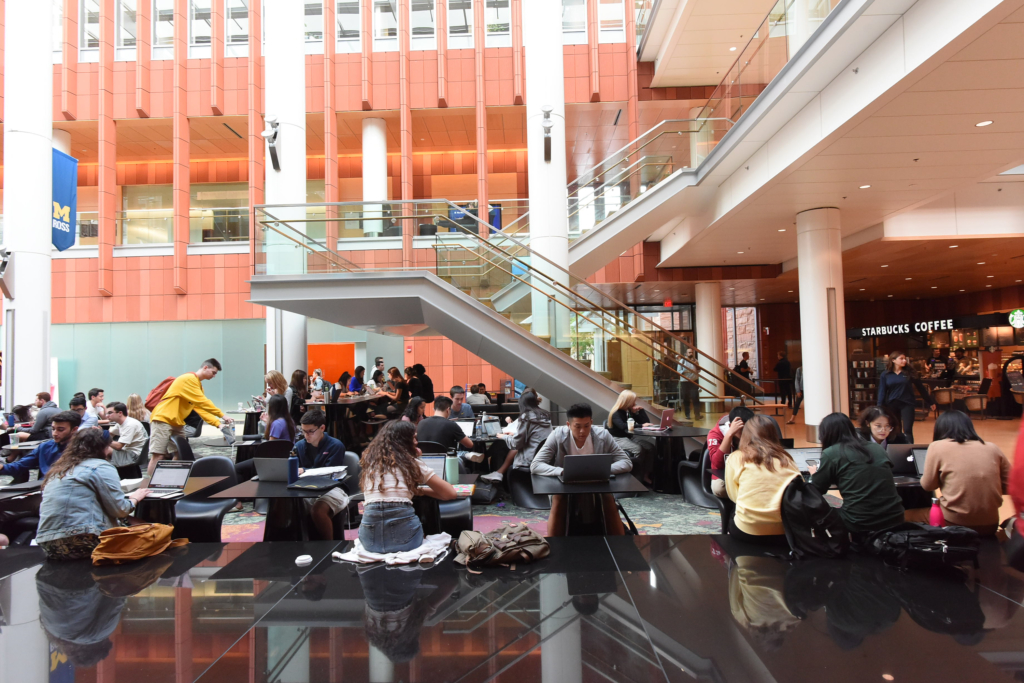
Ross Commons Area
When you open Tik Tok and watch a video, you aren’t really thinking about the business behind that catchy song that’s playing in the background.
At the University of Michigan’s Ross School of Business, two students have created a community that is dedicated to just that — educating students about the music business industry and giving them the opportunity to connect and learn about the expansive space and all that it entails. As an organization, the Michigan Music Business Club (MMBC) at the University of Michigan, offers education and career exposure to students who are interested in breaking into the business side of the music industry and learning about what it takes to make an artist successful — from streaming to artist management.
“I want to create an organization that will allow for there to be a community at the Ross School of Business of people who are like-minded in the sense that they want to go into the music industry and just create a place where people can learn, interact, and engage in the music space,” Jonathan Hayman, co-founder of MMBC and Ross Class of 2022 undergrad, says.
Since the club’s formation in 2019, MMBC has hosted a number of notable speaker events, including one with Sean McMullan, the director of Amazon Music. In addition to speaker events, MMBC also hosts social events and internship recruitment events for its members to learn more about the industry and get their foot in the door. An organization made up of students from business backgrounds to music school, MMBC, in many ways, functions like a mini record label.
“We have our marketing team, HR team, strategic development team, finance team, and our events team,” Cassie Alexe, co-founder of MMBC and Ross Class of 2022 undergrad, says. “That’s sort of the breakup of our club and it really does mirror a record label.”
MUSIC AS BUSINESS
Hayman and Alexe are passionate about music. And while the Ross School of Business doesn’t offer any classes specific to the music industry, the undergraduate business education that students receive can be directly applied to many aspects of the industry.
“In classes, like STRAT 290, they teach you about the strategy of how organizations are run efficiently,” Hayman says. “When you’re managing an artist, you’re essentially managing a corporation, but their company specializes in releasing art in the form of music. Learning how to properly manage a corporation or launch a company from the ground up can be parallel directly to something like artist management.”
Because the music industry is so multi-faceted, there are a variety of ways that one can enter the industry – from artist management to marketing and entertainment law. Hayman, who currently is interning as an A&R Intern in Los Angeles, likes to keep an open ear to whoever is making noise. In his freshman year, he founded an artist management company, The Group, that has helped rising artists reach millions of streams across digital streaming platforms.
“I think the biggest thing we’ve seen is that anyone can make music, and anyone can put it out there,” Hayman says. “Having a label backing you has increasingly become less and less of a thing. With that being said, it’s going to be about scouting these artists who are going to be more independent than ever because these artists don’t need the backing of a label to blow up on Tik Tok or a streaming platform.”
MUSIC IS SOCIAL
Traditionally, the music industry has been one that music labels and corporations controlled under a tight monopoly. Increasingly, however, digital streaming platforms (DSP) and social media outlets, such as TikTok, are creating mediums for artists to independently share their music with the world without the need of a label or corporation.
One of the key reasons why TikTok is changing the industry is because the social media platform offers an often unpredictable path to traditional music success. In other words: it’s disruptive.
“To a large extent, streaming services and commercial radio stations still push a predictable range of pop behemoths – your Swifts, your Grandes, your Biebers – but TikTok is a different ball game,” Katherine Rodgers, a journalist, writes for TechRadar. “Huge pop hits frequently won’t register on the app, while older tracks, tracks by unsigned artists or esoteric remixes reign supreme on the TikTok algorithm.”
TikTok has given the likes of Fleetwood Mac and Megan Thee Stallion viral success. And the social media platform isn’t going away any time soon.
“I think a big reason why Tik Tok is so successful is because people are just getting exposed to music that they’ve never heard of before and it’s a great way to discover new music,” Alexe says.
For Alexe, the social element of music is fascinating. Like many, her passion for music is rooted in one of the most traditional music listening experiences: live concert. After her experience at Governor’s Ball, a music festival in New York City, Alexe knew she wanted to play a role in the world of music.
“[Music is] the one thing that can really amplify any emotion that you’re feeling, and I really love that,” Alexe says.











Questions about this article? Email us or leave a comment below.